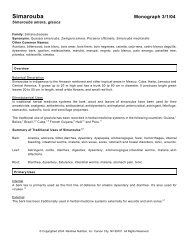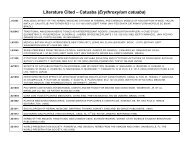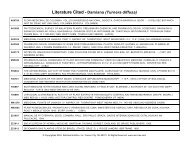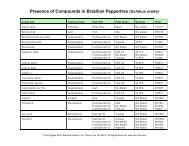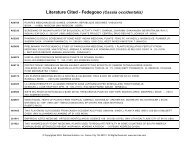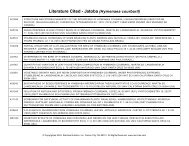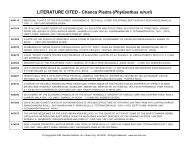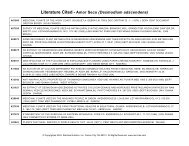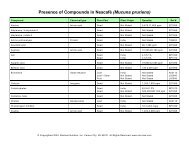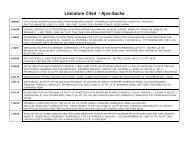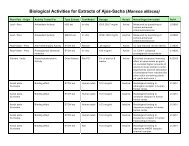Organ Specific Guide - Raintree Nutrition, Inc
Organ Specific Guide - Raintree Nutrition, Inc
Organ Specific Guide - Raintree Nutrition, Inc
You also want an ePaper? Increase the reach of your titles
YUMPU automatically turns print PDFs into web optimized ePapers that Google loves.
AMAZON KIDNEY SUPPORT<br />
Description: A synergistic formula of powerful rainforest plants traditionally used in South America for<br />
kidney stones.<br />
Traditional uses by organ or system: Kidneys/Urinary Tract: For kidney stones and gout.<br />
Ingredients: A proprietary blend of chanca piedra (Phyllanthus niruri), boldo (Peumus boldus), erva tostão<br />
(Boerhaavia diffusa), cipó cabeludo (Mikania hirsutissima), and abuta (Cissampelos pareira).<br />
Suggested Use: Take 2 capsules 3 times daily.<br />
Contraindications: Not to be used during pregnancy or while breast-feeding.<br />
Drug Interactions: May potentiate diabetic, heart, anticoagulant and diuretic medications.<br />
Other Practitioner Observations and Possible Precautions:<br />
• Several plants in this formula have been documented to reduce blood pressure and/or have a mild<br />
cardiac depressant effect in animal studies. Individuals with low blood pressure should be monitored for<br />
this possible effect.<br />
• Several plants in this formula contain coumarin which thins the blood. Those individuals with blood<br />
disorders, such as hemophilia, should be monitored closely for this possible effect.<br />
• Several plants in this formula have diuretic activity. Chronic long-term use of any diuretic can cause<br />
electrolyte and mineral imbalances which should be monitored.<br />
Synopsis of research: (Please the online Tropical Plant Database for all cited research.)<br />
• Chanca piedra has been documented in human and animal studies to have the ability to block the<br />
formation of calcium oxalate crystals as well as provide a direct antilithic action. Three new studies were<br />
published in 2006 on chanca piedra's beneficial uses for kidney stones and gout. In a long-term randomized<br />
study with 150 human patients with a history of kidney stones, researchers confirmed the plant's<br />
ability to prevent reoccuring stone formations in humans and reported: "Regular self-administration of<br />
P. niruri [chanca piedra] after extra-corporeal shock wave lithotripsy for renal stones results in an<br />
increased stone-free rate that appears statistically significant for lower caliceal location." A 2006 animal<br />
study confirmed the plant's use for gout reporting that it: "significantly reversed the plasma uric acid level<br />
of hyperuricemic animals to its normal level in a dose-dependent manner, comparable to that of allopurinol,<br />
benzbromarone and probenecid which are used clinically for the treatment of hyperuricemia and<br />
gout." Another 2006 study with rats indicated that chanca piedra:"may have a therapeutic potential, since<br />
it was able to modify the shape and texture of calculi to a smoother and probably more fragile form,<br />
which could contribute to elimination and/or dissolution of calculi." In an earlier 2002 rat study, researchers<br />
reported that chanca piedra strongly inhibited the growth and number of stones formed over a control<br />
group. In 2003, scientists again confirmed in vitro that chanca piedra could help prevent the formation<br />
of kidney stones. Previously (in the mid-1980s), the antispasmodic activity of chanca piedra was reported.<br />
This led researchers to surmise that "smooth muscle relaxation within the urinary or biliary tract<br />
probably facilitates the expulsion of kidney or bladder calculi." Researchers had already reported chanca<br />
piedra's antispasmodic properties and smooth muscle relaxant properties (including a uterine relaxant<br />
effect) in several earlier studies.<br />
• Boldo, and/or its main chemical boldine, has shown in various studies over the years to possess diuretic,<br />
febrifuge, and anti-inflammatory properties as well as the ability to reduce excess uric acid.<br />
• Erva tostão is traditionally used in Brazilian herbal medicine as a diuretic, for urinary tract disorders, renal<br />
disorders, kidney stones, cystitis, and nephritis.<br />
• Cipó cabeludo is widely used in traditional herbal medicine systems in Brazil as a powerful diuretic. Its<br />
main documented uses there are for kidney stones, to help lower uric acid levels, and for gout, urinary<br />
tract infections, cystitis, and urethritis.<br />
• Abuta and many of its main active constituents have been documented by scientists to have significant<br />
antispasmodic, muscle relaxant and analgesic properties. It is traditionally used in Peruvian herbal<br />
medicine systems for kidney stones.



